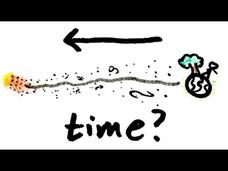Professor Dave Explains
IIT/JEE Chemistry Practice #30: Spontaneity
Practice REAL problems from actual past IIT/JEE exams with Professor Dave!
Curated Video
Entropic Time (Billy Joel Parody)
Time runs backward in this exploration of why time runs forward, to the tune of Billy Joel's "For The Longest Time"
Curated Video
Turning the Universe Upside Down
Nobel Laureate Roger Penrose (Oxford) tells us why he is sceptical of the inflationary theory of cosmology.
Curated Video
Octaves and Harmonics
Nobel laureate in Physics David Politzer (Caltech) uses a banjo to demonstrate how octaves and harmonics arise from vibrating strings.
Curated Video
No Explanation
Nobel Laureate Roger Penrose, University of Oxford, describes why he believes that inflationary cosmology doesn't explain the mystery of why the universe began in such an unlikely, very smooth state, arguing that had it started out...
Curated OER
Thermodynamic Entropy Definition Clarification
In the previous video, Sal introduced students to entropy and the 2nd Law of Thermodynamics. An example he used had a couple of points that were factual, but not clear to many students. In this video, he goes over those points again in...
Curated OER
Entropy Intuition
Sal provides two definitions for entropy: the thermodynamic definition and the mathematical definition. Entropy and the 2nd Law of Thermodynamics are the focuses of this chemistry video. The law states that the change in entropy in the...
Curated OER
More on Entropy
Entropy is the focus of this chemistry video. More specifically, Sal drives the point home that entropy is a macro state variable. This means that a change in the universe's entropy must always be positive, because when heat is added to...
Crash Course
Entropy: Embrace the Chaos!
Chemistry makes it seem that everything has its place and behaves according to different laws. Not always true! Disorder and chaos can and do happen in chemistry; scientists call this disorder entropy. Learn about entropy and its...
Curated OER
STEMbite: Entropy of the Playroom
Here is a darling demonstration of the second law of thermodynamics. Entropy has increased in a toddler's playroom as he removed toys and books off shelves and left them on the floor when he moved to the next activity. Yes, microscopic...
Crash Course
Thermodynamics: Crash Course History of Science #26
Scientists discovered the first law of thermodynamics 25 years after the second law of thermodynamics. The seemingly obvious discoveries sometimes confuse scientists while more complex challenges encourage extra study—and take more time...
Crash Course
Thermodynamics: Crash Course Physics #23
Teach the basics of thermodynamics with an energizing video. A thorough lesson explains the First and Second Law of Thermodynamics. Scholars learn how these laws apply to isovolumetric, isobaric, isothermal, and adiabatic processes and...
Bozeman Science
Life Requires Free Energy
Free energy, get your free energy here! Learners see that all organisms require free energy, which comes from the sun. The lesson explains the first two laws of thermodynamics and then analyzes metabolism, via glycolysis, on a very...
Veritasium
What Is NOT Random?
Twelve fundamental particles exist in our universe, and they interact in exactly four ways. Does this mean we should be able to predict the future? We know entropy increases, but how does that impact us? These questions and more become...
Crash Course
Why We Can't Invent a Perfect Engine: Crash Course Engineering #10
Your car's engine is likely to be only 20 percent thermally efficient. Why so inefficient? Viewers of the 10th video in an engineering series learn how the second law of thermodynamics and entropy limit the efficiency of a car engine....
MinutePhysics
Where Does Complexity Come From? (Big Picture Ep. 3/5)
Mixing milk and coffee is a complex example in the eyes of a quantum physicist. A creative lesson compares a tendency toward entropy with complexity. Learners view a mixture of coffee and milk as first simple, then complex, and finally...
Bozeman Science
Gibbs Free Energy
Energy is neither created nor destroyed, but what about free energy? Where does that fit into thermodynamics? In the video, learners explore simple the spontaneous reaction examples of enthalpy, entropy, and temperature, and then apply...
MinutePhysics
Why Doesn't Time Flow Backwards? (Big Picture Ep. 1/5)
Take a ride through time as you learn about the status of the past, present, and future from a physics perspective. The video instructor explains the Big Bang Theory through the equilibrium of time. Learners connect the Second Law of...
Curated OER
Efficiency of a Carnot Engine
In the world of chemistry, efficiency is defined as: the work a system does, divided by the energy given to that system to complete the work. Sal illustrates this important chemistry concept by drawing a PV graph that shows a Carnot...
Curated OER
Carnot Cycle and Carnot Engine
The Carnot Cycle is the focus of this chemistry video. Carnot was a French engineer who proved that energy transfers happen in a cycle. They start and finish at the same pressure, volume, and temperature. A system that completes the...
Curated OER
Work Done by Isothermic Process
Since the temperature of a system is so crucial in its energy transformation, Sal goes into two processes which greatly affect temperature in a system: The Isothermic Process and The Adiabatic Process. He sets up an example, and...
Curated OER
Hess's Law and Reaction Enthalpy Change
Sal introduces students to Hess's Law. The law states that the energy change of a process is independent of how we get from one state to another. He sets up a series of reactions, and solves them to illustrate the principles behind...
Curated OER
Enthalpy
Sal introduces students to the term, "enthalpy" in this chemistry video. He defines enthalpy as: the internal energy, plus the pressure times the volume found in a system. He constructs a PV diagram to illustrate this point.




















